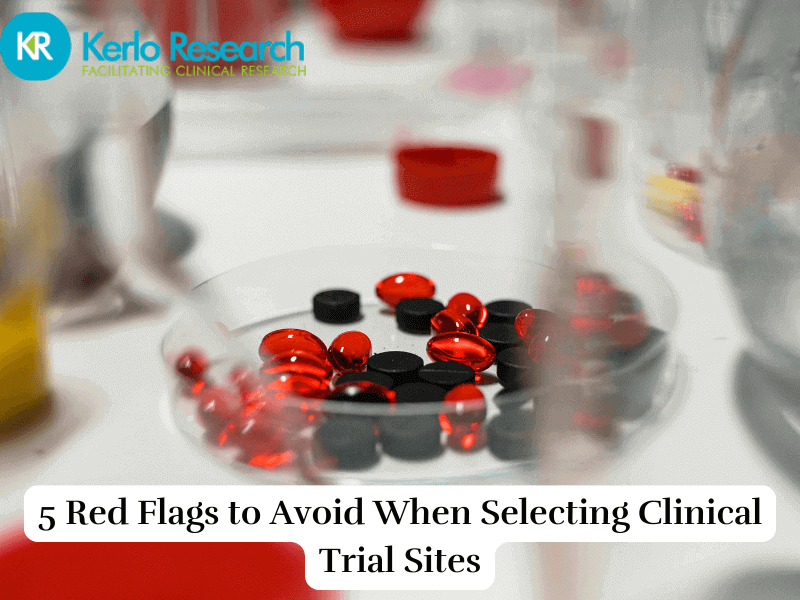Selecting the right clinical trial sites is one of the most difficult steps for sponsors. The wrong choice can result in inefficiencies, delays, and compromised data integrity, which ultimately impact both the trial’s success and a sponsor’s reputation. So, it’s pretty necessary to know about what to avoid while selecting clinical trial sites
To make informed choices, sponsors need to look for signs that might indicate potential problems down the line. This article outlines 5 red flags to avoid when selecting clinical trial sites, ensuring a successful, high-quality clinical study.
Let’s delve into the article to know in depth about the red flags that one need to avoid when selecting clinical trial sites:

Red Flags To Avoid When Selecting Clinical Trial Sites
When sponsors have the idea about how to choose the best site for your clinical trial, they must know about the red flags to avoid when choosing clinical trial sites as well, below-mentioned are a few of the red flags:
Insufficient Patient Recruitment and Retention Capabilities
One of the most common issues that hinder clinical trials is the inability of a site to recruit and retain a sufficient number of eligible participants. A strong recruitment strategy and historical evidence of patient engagement should be non-negotiables when evaluating potential sites.
- Warning Signs: Past trials with high dropout rates, a lack of recruitment infrastructure, or limited access to the target population.
- Why It Matters: Without a robust recruitment and retention strategy, trials are at risk of delays, or worse, may yield insufficient data to meet study endpoints.
Lack of Relevant Experience with the Indication or Protocol Complexity
Clinical trial sites should demonstrate experience with both the specific disease or therapeutic area and the complexity level of your study’s protocol. Sites without the relevant expertise may struggle with patient safety management, regulatory compliance, or accurate data collection.
- Warning Signs: Limited experience with similar protocols, staff unfamiliar with specific medical procedures or treatments, or a lack of specialized equipment.
- Why It Matters: Inexperienced sites can lead to protocol deviations, data errors, and increased safety risks, which all contribute to compromised study outcomes.
Poor Regulatory and Compliance History
Ensuring that the site has a strong track record of compliance with Good Clinical Practice (GCP) guidelines and local regulations is essential. Sites with poor compliance histories could increase the risk of audit findings, delayed approvals, or even legal challenges.
- Warning Signs: History of regulatory violations, failed inspections, or an inability to provide compliance documentation.
- Why It Matters: Regulatory non-compliance can delay or derail a study, causing reputational damage and risking the validity of trial results.
Inadequate Site Infrastructure and Technology
With the growing reliance on electronic data capture, real-time monitoring, and advanced analytics, trial sites need to be equipped with up-to-date technology and infrastructure. Sites lacking modern capabilities may struggle to meet sponsor requirements or experience delays in data submission.
- Warning Signs: Lack of electronic data capture systems, slow internet, outdated lab facilities, or minimal data security protocols.
- Why It Matters: Poor infrastructure can result in delays, data integrity issues, and difficulty with remote monitoring, leading to a potential compromise in the study’s timeline and data quality.
High Staff Turnover and Inexperienced Staff
A stable, experienced staff is fundamental to the consistency and reliability of clinical trials. High turnover or inexperienced staff can disrupt workflow, increase training time, and lead to protocol deviations.
- Warning Signs: Frequent staffing changes, high number of temporary staff, or evidence of insufficient training programs.
- Why It Matters: Consistent staffing helps ensure protocol adherence, timely data collection, and quality patient interactions, all of which contribute to trial success.
Final Words
Choosing the right clinical trial site is essential for the success and integrity of any clinical study. Sponsors should be vigilant and proactive in evaluating potential sites, paying close attention to signs that could indicate future issues. By recognizing and avoiding these red flags sponsors can better position their studies for success.
Careful site selection not only enhances study efficiency but also strengthens the sponsor’s ability to bring innovative treatments to market. So, if you’re ready to partner with experienced, reliable clinical trial sites? Contact Kerlo Sense today to discuss your trial needs and explore how we can help you ensure a successful study.

